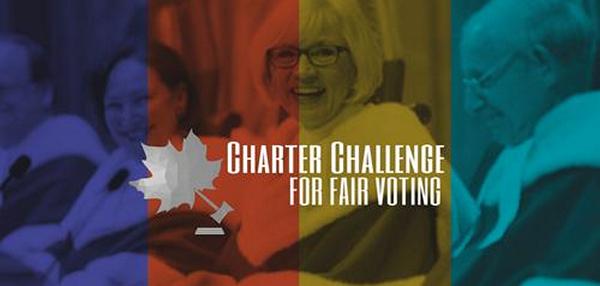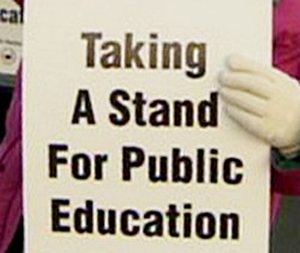
No. 45October 14, 2021
|
Opposition to Outmoded First-Past-the-Post Electoral System
Federal Government Finally Responds to Charter Challenge
On September 29, Fair Voting BC and Springtide Collective for Democratic Society announced that the federal government has finally responded to a Charter Challenge of the first-past-the-post (FPTP) system of elections they filed two years ago, on October 6, 2019. The government advised it will be filing its legal documents in early spring 2022. The case is expected to be heard in fall 2022.
 The two organizations have set up a joint organization and website called Charter Challenge for Fair Voting (CCFV). Their application asks the Court for a one-year suspended ruling striking down sections of the Canada Elections Act and giving the Parliament one year to enact amendments.
The two organizations have set up a joint organization and website called Charter Challenge for Fair Voting (CCFV). Their application asks the Court for a one-year suspended ruling striking down sections of the Canada Elections Act and giving the Parliament one year to enact amendments.
In their application to the Ontario Superior Court of Justice, CCFV argues that the FPTP system violates Section 3 of the Charter of Rights and Freedoms which states “Every citizen of Canada has the right to vote in an election of members of the House of Commons or of a legislative assembly and to be qualified for membership therein.” The applicants state that Section 3 embodies “three overarching rights: 1) effective representation; 2) meaningful participation (including a free and informed vote); and 3) fair and legitimate elections.” On its website, CCFV references a ruling by then Chief Justice of the Supreme Court Beverley McLachlin who stated that “Each citizen is entitled to be represented in government. Representation comprehends the idea of having a voice in the deliberations of government.”
Fair Voting BC and Springtide Collective for Democratic Society also argue that Section 15(1) of the Charter is violated. This section states: “Every individual is equal before and under the law and has the right to the equal protection and equal benefit of the law without discrimination and, in particular, without discrimination based on race, national or ethnic origin, colour, religion, sex, age or mental or physical disability.”
The Charter does not specifically cite political belief/affiliation as a target of discrimination that falls under its protection. The applicants nonetheless state it should be treated as such and argue that FPTP “disadvantages voters of small parties with particular ideologies or lenses, particularly where they are geographically dispersed.” It says these voters “are less able to successfully elect an MP who will represent their views in Parliament,” leaving them “without a voice in Parliament.”
Before considering arguments on these claims, the Court will have to decide if it will grant “public interest standing” to Fair Voting BC and Springtide. The applicants must establish that the issue to be adjudicated is of broad public concern and that they qualify as legitimate representatives and experts on the matter.
The application states: “The present application raises serious justiciable issues. The rights to vote and to legal and political equality are among the most fundamental rights accorded to Canadians. The constitutionality of Canada’s electoral system is an issue of profound and far-reaching consequence that goes to the very heart of our legal and political order. Under FPTP, voters in an electoral district who do not vote for the elected MP are marginalized and systemically disenfranchised. They effectively have no voice in Parliament. Politicians elected through FPTP have a vested interest in maintaining this electoral system, as do voters who benefit from a disproportionately enhanced influence in government.”
The application provides the credentials of the two organizations and argues they are in “the best position to advance in a non-partisan fashion these broad issues in a court of law.”
Renewal Update will keep readers informed about this lawsuit which it considers is of concern to the polity because the current electoral system is not representative as it claims to be. Renewal Update will also provide information on related issues such as what are called constitutional conventions and the theory of representation also known as Covenant Thesis. The studies the Marxist-Leninist Party of Canada (MLPC) has been conducting for several years now show that any system based on this theory is obsolete and requires profound democratic renewal.
The application of Fair Voting BC and Springtide Collective for Democratic Society can be read in full here.
Stop Paying the Rich; Increase Funding for Social Programs!
Quebec Government’s Privatization of Services Required by Parents and Youth
– Geneviève Royer –
More information is circulating which confirms that the Quebec government has handed over millions of dollars of public funds to private education companies which exploit problems facing parents and youth in a manner detrimental to them and the public interest. Data collected by the newspaper La Presse following an access to information request shows that over the last five years, more than $10 million has been removed from the public sector and put into the hands of private firms. It is done in the name of providing students with access to remedial education, psycho-education, speech therapy, and other such services but such access is precisely what they are being deprived of.
 Quebec’s Minister of Education, Jean-François Roberge, sent a letter to the directors general of school service centres on October 4, one day before World Teachers’ Day. The letter came in response to a family’s public denunciation of the fact that their child, diagnosed with a language disorder, was not given access to the speech therapist at the kindergarten she attended. In response the Minister cynically claimed the government is doing its duty by saying: “If unable to provide the services it deems necessary for a child, the school organization must use all the levers at its disposal to ensure the provision of services, such as by availing itself of the private sector.”
Quebec’s Minister of Education, Jean-François Roberge, sent a letter to the directors general of school service centres on October 4, one day before World Teachers’ Day. The letter came in response to a family’s public denunciation of the fact that their child, diagnosed with a language disorder, was not given access to the speech therapist at the kindergarten she attended. In response the Minister cynically claimed the government is doing its duty by saying: “If unable to provide the services it deems necessary for a child, the school organization must use all the levers at its disposal to ensure the provision of services, such as by availing itself of the private sector.”
Despite Minister Roberge’s indignation, the lack of services in schools is known and recognized by all school community interveners. Figures provided by the five sites of the Montreal Integrated University Health and Social Services Centre (CIUSSS) in 2021 show there are more than 11,400 children awaiting speech-language therapy services. In Montreal, more than 2,300 youth under the age of 18 are on waiting lists for speech-language therapy services.
The Quebec Association of Speech Language Pathologists and Audiologists underscores the government’s responsibility for this state of affairs. “Limited speech-language pathology resources and disparities in the organization of services from one region to another have led to heartbreaking choices. As a result, some School Service Centres only serve students with severe difficulties, leaving out all those with mild to moderate difficulties, while others offer a universal service, but only at the preschool and 1st cycle of elementary school, leaving out all older students,” the Association notes.
Jacques Landry, president of the Fédération des professionnelles et professionnels de l’éducation du Québec (FPPE-CSQ) adds that “[…] reimbursing the costs incurred privately by a single family is not the magic wand that will sort out the chronic problems of lack of services in schools and attraction and retention of professional staff, inequity of access and the confusion that reigns in the financing and organization of services for students with special needs […]
“At this very moment, in all of Quebec’s regions, there are over 500 vacant positions for school professionals, including nearly 100 in speech-language therapy. We are shocked and concerned to see a similar situation in psychology and psycho-education. This is huge, especially when one considers that each professional may provide services for between 1,000 and 2,000 students.”
 Julie Tassé, president of the Syndicat des professionnelles et professionnels Laval-Rive-Nord (SPPLRN-SCFP 5222) also points out: “In the short term, opening up to the private sector with reimbursement by the public school may seem attractive to parents. But it is only a temporary and cosmetic measure. In the medium and long-term, it empties the public network, and it’s the children of non-wealthy families who will be deprived of services.”
Julie Tassé, president of the Syndicat des professionnelles et professionnels Laval-Rive-Nord (SPPLRN-SCFP 5222) also points out: “In the short term, opening up to the private sector with reimbursement by the public school may seem attractive to parents. But it is only a temporary and cosmetic measure. In the medium and long-term, it empties the public network, and it’s the children of non-wealthy families who will be deprived of services.”
Clearly, the government’s decision to inadequately fund the education system and ensure the necessary personnel is directly linked to its decision to hand over public funds to private interests. Public funds must be used to finance the solutions put forward by education experts, those who work with students on a daily basis. This is why the Marxist-Leninist Party of Canada demands that governments stop paying the rich and increase investments in social programs. Political renewal to remove governments which do not represent the public interest is the order of the day.
(To access articles individually click on the black headline.)
Send your articles, photographs, reports, views and comments to editormlpc@cpcml.ca

